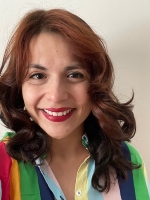By Deysi Vatman, LMSW
Cancer and its aftereffects on adolescent and young adult (AYA) survivors can significantly impact their lifelong care. It is imperative to understand the effects of a cancer diagnosis on young adults and its aftermath. Susan Sontag, while receiving treatment for breast cancer, wrote in her book Illness as a Metaphor that, “Everyone who is born holds dual citizenship, in the kingdom of the well and in the kingdom of the sick. Although we all prefer to use the good passport, sooner or later each of us is obliged, at least for a spell, to identify ourselves as citizens of that other place.” For a young adult, being diagnosed with cancer introduces complex challenges, including treatment complications, social and relational impacts, and lifelong implications.
Survivors of cancer often face the complexities of the illness, which affects both body and mind. Kittel, Seplaki, and Conwell (2023) found that cancer survivors entering survivorship after curative treatment experience an increased rate of depressive symptoms, anxiety, and death ideation during the first year of survivorship. Many cancer survivors, throughout the survivorship continuum, experience elevated anxiety, depression, psychological distress, and often manage the long-term side effects of treatment and chronic illnesses.
Additionally, research by Cordova et al. (2017) highlights that up to 35% of cancer survivors report PTSD symptoms related to their cancer treatment and diagnosis, including intrusive thoughts, hypervigilance, and emotional numbness. Other studies indicate that cancer survivors frequently experience a reduced quality of life, with many reporting persistent physical, emotional, and social challenges even years after treatment. According to Deimling et al. (2006), nearly 30%-40% of survivors report difficulty returning to work or resuming previous social activities due to these enduring mental health issues.
As oncology social workers in a clinical setting, it is crucial to remain aware of these impacts and recognize the barriers a cancer diagnosis may impose on our patients. When meeting a patient for the first time, an important question to consider is, “What can we do to support this individual’s success post-treatment?” and “What resources will be beneficial 5, 10, or 15 years after treatment?”
Each hospital and clinic has a variety of tools to assist patients. Research has shown that social support and peer groups can provide young cancer survivors with a sense of community and shared experience. Although many survivors have family, friends, and spouses to support them, not all patients have the same level of support in their personal lives. Connecting cancer survivors with peer support resources can alleviate loneliness, reduce anxiety, and improve coping skills.
For AYA survivors, a diagnosis can disrupt education, social circles, and employment. Directing AYA survivors to support groups or online communities offers a space to foster emotional resilience and reduce the isolation that many survivors experience. Rosenberg and Wolfe (2013) noted that AYA survivors often require psychoeducation and emotional support specifically tailored to their age, as generic support resources may not address their unique needs for life transitions, identity formation, relationship dynamics, and educational support.
The emotional challenges for AYA survivors frequently revolve around the fear of recurrence and the impact of a cancer diagnosis on body image, social and romantic relationships, and long-term complications from treatment. Research supports that connecting AYA survivors with CBT therapists, providing mindfulness resources, and encouraging expressive outlets like journaling or artwork can foster resilience, enable expression of complex post-treatment emotions, and offer long-term tools for wellness.
From a personal perspective as an AYA survivor, experiencing cancer as a pediatric patient led me to find supportive spaces organized by my oncology hospital. My oncology team and social worker played a vital role in helping me navigate the complexities of survivorship, connecting me with a community where I did not feel alone, and helping me transition from a “citizen of the unwell” back to wellness. As social workers, our role is to provide guidance, support, and encouragement for patients not only during treatment but also by helping set them up for long-term success.
References
Deimling, G. T., Bowman, K. F., Sterns, S., Wagner, L. J., & Kahana, B. (2006). Cancer-related health worries and psychological distress among older adult, long-term cancer survivors. Psycho-Oncology, 15(4), 306–320. https://doi.org/10.1002/pon.955
Cordova, M. J., Riba, M. B., & Spiegel, D. (2017). Post-traumatic stress disorder and cancer. The Lancet Psychiatry, 4(4), 330–338. https://doi.org/10.1016/S2215-0366(17)30014-7
Rosenberg, A. R., & Wolfe, J. (2013). Palliative care for adolescents and young adults with cancer. Clinical Oncology in Adolescents and Young Adults, 3, 1-9. https://doi.org/10.2147/COAYA.S34871
Mitchell, A. J., Ferguson, D. W., Gill, J., Paul, J., & Symonds, P. (2013). Depression and anxiety in long-term cancer survivors compared with spouses and healthy controls: A systematic review and meta-analysis. The Lancet Oncology, 14(8), 721–732. https://doi.org/10.1016/S1470-2045(13)70244-4

